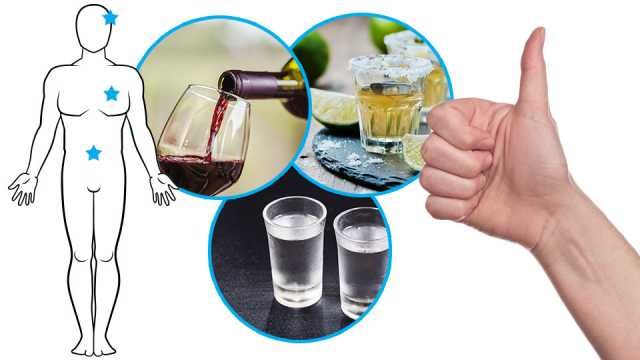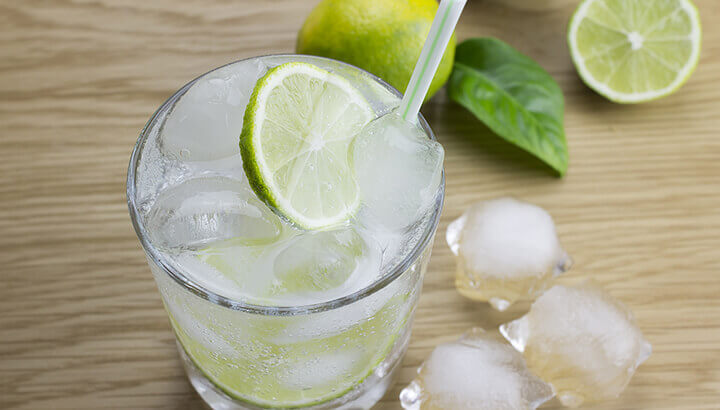
Sometimes, it’s nice to bring in the weekend with a glass or two of wine, a mug of beer or a round of cocktails. We’ve long known that drinking too much is bad for us, but also that drinking a little bit responsibly isn’t likely to cause harm. However, it’s recently been found that drinking in moderation may have some health benefits.
A body of research has found that drinking alcohol — any kind — in moderation may help to protect the cardiovascular system. For just one example, a rather large 2010 study published in the journal Circulation linked drinking alcohol in moderation to a lower risk of coronary heart disease. That’s pretty exciting, and a good reason to raise a glass. Specifically, the American Heart Association recommends no more than one glass per day for women, and two for men.
Aside from their alcohol content, some alcoholic drinks are healthier than others. Read on to discover six of the best ones for your body, and some tips on which ones may be best to avoid.
Red wine
You’ve probably already heard that red wine is probably the healthiest form of alcohol you can drink. It contains flavonoid antioxidants, which have been linked to lowering inflammation and improving the health of many systems in the body, as well as other polyphenol antioxidants. On top of that, red wine is a source of resveratrol, a compound under the microscope for potentially contributing to longevity and fighting cancer. Resveratrol is found naturally in the skins of grapes.
This party favorite has been linked not only to improving heart health, but also to improving the body’s management of cholesterol. To make your red wine experience even healthier, go for an organic variety. That way, you’ll know the grapes haven’t been grown in pesticides.
White wine

While red wine seems to edge out white wine by just a bit in terms of health benefits, white wine is also a contender. Some research has found that white wine may, like red wine, also help to improve cholesterol. Plus, both types of wine had potential glucose-balancing benefits. It’s also a good source of flavonoid antioxidants, and better to enjoy organic. So, if you prefer wine over red, don’t worry, you’re likely doing yourself good with that evening glass.
Probiotic beer
Yes, this is now a thing! Beer itself contains B-vitamins and bone-strengthening silicon, and despite usually being high in carbs and often containing additives, there are some more nutritious, gluten-free, additive-free varieties out there. Now, however, a group of researchers at the University of Singapore have created a probiotic sour beer which may help to promote good gut health. A healthy gut is important not only for digestion, but also for a balanced mood and a strong immune system.
The mind behind the new probiotic beer, Chan Mei Zhi Alcine, a fourth-year Food Science and Technology student at the University of Singapore, says:
“For this beer, we used a lactic acid bacterium as a probiotic micro-organism. It will utilize sugars present in the wort to produce sour-tasting lactic acid, resulting in a beer with sharp and tart flavors. The final product, which takes around a month to brew, has an alcohol content of about 3.5 percent.”
The research team has filed a patent and is hoping to partner with companies to market their beer soon. We’ll have to keep a lookout for it in the near future.
Tequila
While hard liquors like tequila are absolutely not healthy (and positively destroying) in large amounts, one shot of tequila per day may provide some benefits. First of all, if you get pure tequila, it likely won’t have additives. Secondly, tequila has been proposed to have both prebiotic and probiotic benefits, thanks to the presence of inulin and fructans.
Vodka and gin

Clear liquors like vodka and gin (and some kinds of tequila) that have been thoroughly and properly distilled are free of gluten and additives. Because they are not high in congeners (byproducts of fermentation), they are least likely to result in a nasty hangover. Unless, of course, you have too much. It’s easy to overdo it with these, so please be careful.
Types of alcohol to avoid
Here are the drinks you may want to skip:
- Many beers contain gluten, a high carbohydrate count and a variety of additives. If you’re a beer lover, it might be worth it to investigate brands that deliver a more pure product. You may have to do some digging, but hopefully the type you find tastes great and is worth it.
- Dark liquors such as brandy and rum may lead to the worst hangovers. If you’re prone to alcohol-induced headaches, steer clear of these.
- Mixed drinks that include sugars and syrups are the worst. Many flavor syrups contain artificial flavors and colors, plus a whole whirlwind of inflammatory, teeth-rotting sugar. Additionally, since many types of liquor are often added to these types of drinks, it may be easy to accidentally drink too much and end up sick and spinning.
If you do enjoy mixed drinks, your best bet is to keep it to one type of liquor. Also, use real fresh or frozen fruit instead of syrups. If you want to sweeten your drinks, try raw honey instead of sugar, and never underestimate the “yum” factor of fresh herbs such as mint and cilantro in cocktails. Be safe and enjoy!
— Tanya Mead

